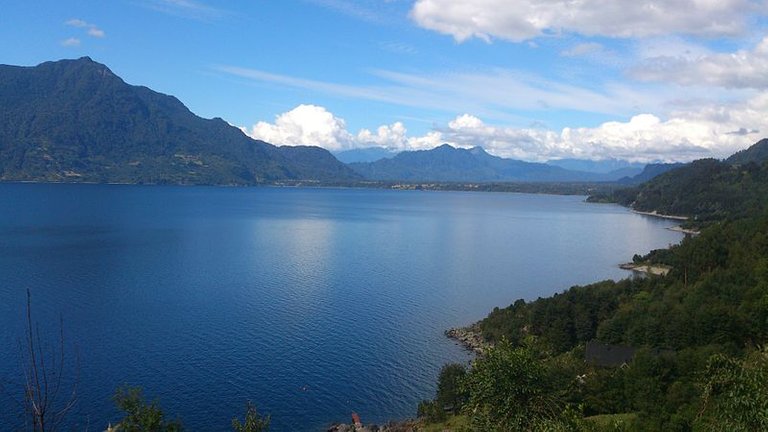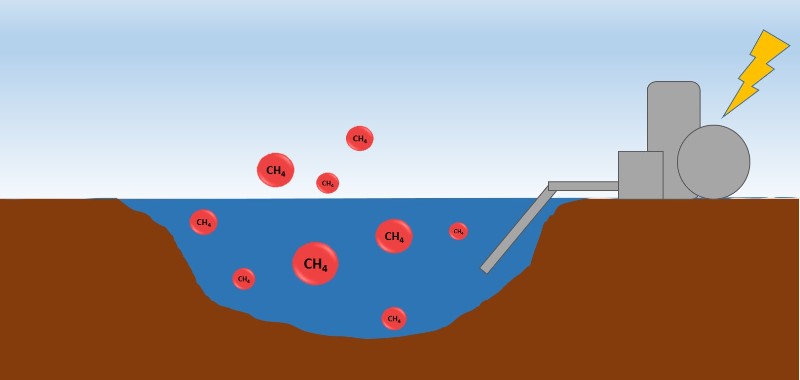We know that the planet urgently needs to move away from our dependence on fossil fuels, and although technologies based on renewable energy sources have gained a lot of ground in recent years, they still have a long way to go to completely replace fossil fuels. But perhaps while the transition is taking place we need to think of a way to continue using these fuels and maintain a balance in greenhouse gas emissions and achieve a balance in carbon emissions.

Lakes and large freshwater reservoirs can act as sources of methane. Image credit: Wikimedia commons.
In this regard, a group of researchers from the University of Basel have suggested an interesting idea, to use the methane that occurs naturally in lakes and convert it into methanol, thus using the lakes as a source of biofuel.
The main debate on climate change focuses on emissions of carbon dioxide, CO2, but very little is said about methane, another greenhouse gas which, although less abundant in the atmosphere, has a 100 times greater global warming potential. And although half of the methane released into the atmosphere is a product of human activities, it is also produced by the natural decomposition of biomass. And freshwaters around the world represent a large reservoir of biomass, which is why this group of researchers have raised the potential and possibilities of harnessing the methane produced in freshwater bodies to produce sustainable renewable energy, their theory for harnessing this energy source was recently published in the journal Environmental Science & Technology.
According to this report, lakes and other freshwater reservoirs produce 20% of the world's methane emissions, which theoretically would be enough to meet the world's current energy demands. And because CO2 is continuously absorbed in lakes through the growth of phytoplankton and microbes, the carbon contained in the biomass is converted into methane. Thus, by extracting this methane and converting it into a biofuel, no more carbon would be added to the atmosphere during combustion, since it would be added naturally anyway.
And although it may seem so, this idea is not entirely new, as there is already a precedent. In Lake Kivu, one of the largest lakes in Africa, located between Rwanda and the Democratic Republic of Congo, methane is found in the lake bed in higher concentrations than in any other lake, it is estimated that approximately 55 billion cubic meters of methane dissolved at a depth of 300 m, so since 2016 through the Kivuwatt project it is extracted, cleaned and supplied directly as fuel to supply electricity in Rwanda.

There are already precedents for using methane from a lake to produce electricity. Image by @emiliomoron.
What seemed difficult so far was to try to extract methane from normal lakes whose concentration is much lower, but thanks to the development of new microporous membranes of polymeric material it is possible to separate methane from water with much higher efficiency. In the research the authors have realized the first technical approach using a hydrophobic gas-liquid membrane contactor, with which methane gas can be separated from a mixture with water and the methane concentration can be increased.
With this approach, the researchers will undoubtedly open the debate on the potential and risks of this technology, since more work is needed to know the effects of removing methane from the aquatic environment, but in practice, this method could help to achieve climate objectives, since it would continue to take advantage of a carbon-based fuel, but whose extraction and use leaves us with a neutral balance in the levels of carbon released into the atmosphere.
Thanks for coming by to read friends, I hope you liked the information. See you next time.

It seems to me a good solution to keep the environment healthier, and I really find it great.
I suppose they will be working on making this membrane biodegradable or something like that, and I would love to read more about this project Although it contains quite technical information, I find it extremely interesting.
Greetings friend. It certainly seems like an appropriate solution to maintain a balance in carbon emissions in the atmosphere, as the methane will still get there naturally. I did not read about the biodegradability of the membrane but perhaps it is a concern that if it has not yet arisen it will at some point.